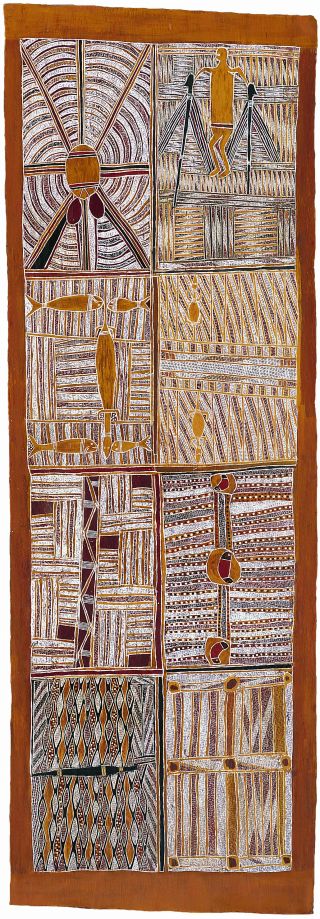393
Arte Útil archive nr:
393
Initiator:
Djambawa Marawili and artists from the Yirrkala region
Location:
Australia
Category:
social
Users:
Natives of Yirrkala
Maintained by:
Queensland Art Gallery | Gallery of Modern Art (QAGOMA)
Certification:
implemented
Duration:
1963 - ongoing
Djambawa Marawili and artists from the Yirrkala region
-
Yalangbara
Description:
The Yirrkala bark petitions 1963 are historic Australian documents that were the first traditional documents prepared by Indigenous Australians that were recognised by the Australian Parliament, and are thus the first documentary recognition of Indigenous people in Australian law. The bark petitions asserted that the Yolngu people owned the land and protested the Commonwealth's granting of mining rights to Nabalco of land excised from the Arnhem Aboriginal Land reserve. The son of one of the Yirrkala plaintiffs, a Gumatj clan leader, Munggurrawuy, was Galarrwuy Yunupingu who assisted in drafting the petitions. More recently, as land cases involving Aboriginal populations have continued to be tried in Australian courts, different traditional art forms have
been used as evidence in court. In the Blue Mud Bay case in the High Court, for example, the Salt Water Pantings were used as part of the case regarding the ownership of fishing rights in tidal waters overlying Aboriginal land at Blue Mud Bay. The case was eventually decided in 2008 declaring that waters The High Court ruled that the water lying over Aboriginal land should not be treated differently from the land itself. Ownership of Aboriginal land adjoining marine waters
in the Northern Territory generally extends to the low tide level.
Goals:
To demand that indigenous’ rights be recognised from the Commonwealth. The artists painted their country and history in an attempt to stop the desecration of their sacred lands and to ensure the health and safety of future generations of Yolngu people.
Beneficial Outcomes:
The result was a parliamentary inquiry which recommended that compensation was owed to the Yolngu. Thus, the petition was the first recognition of native title. In 1971 it was ruled that the Yolgnu people were not able to establish their native title at common law. Justice Richard Blackburn used the notion of terra nullius to justify this.
Images:
